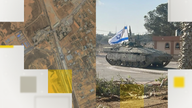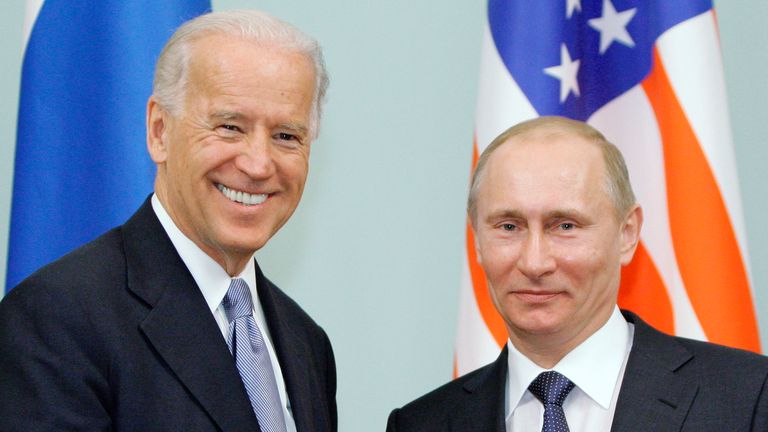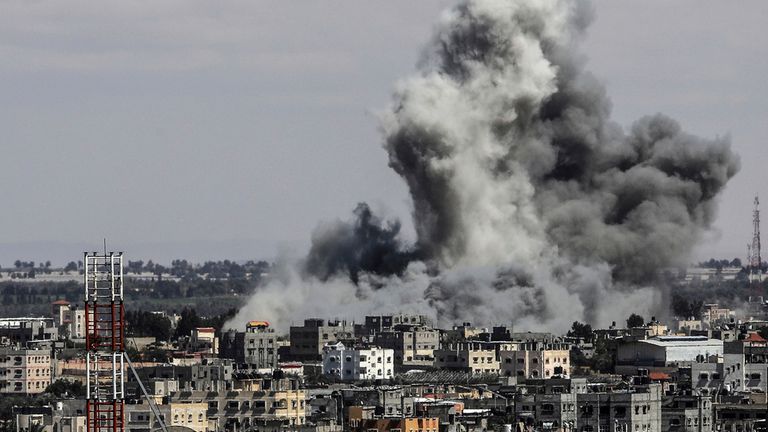Setting red lines is all very well, as long as you follow through when they are crossed.
President Biden knows that all too well.
Too often these lines in the sand turn out to be a flawed tool of geo-political diplomacy.
Western leaders throw them down in key-note speeches as unequivocal threats. "Cross the line, if you dare…" is the rhetoric.
Obama blinked back in August 2013 when Syria's President Assad used a nerve agent, killing 1,400 people.
A year earlier Obama had laid his red line, saying the use of chemical weapons would have "enormous consequences" that would "change my calculus" on US intervention.
Gaza latest: Follow live updates
A decade on, Assad is still Syria's president and is emboldened. He got away with it. It was, of course, not unnoticed by other nefarious world leaders.
Assad drove a coach and horses through Obama's red line.
In 2021, Mr Biden used a summit with Russian President Putin in Geneva to set red lines about Ukraine.
Look how that turned out.
Every red line is distinct and, of course, they vary in terms of the gravity of the event they are seeking to prevent. But the principle behind laying them is the same, as is the message set when they are crossed.
Over the past six months, as Israel has sort to defeat Hamas in Gaza, President Biden did not think he would need to lay out red lines. After all, Israel is one of America's closest allies.
Instead, the Biden administration thought gentle diplomacy and frank back-channels with a "close friend of America" would do the trick.
But gradually, as Mr Biden and the Netanyahu government increasingly diverged on protecting civilians and a plan for "the day after" in Gaza, a red line began to appear - Rafah. This has become Mr Biden's red line for Israel.
The US president has repeatedly made clear his opposition to Mr Netanyahu's insistence on a ground invasion of the southern Gazan city (Mr Netanyahu's own red line) where about 1.4 million people are living, half of them under 18.
The Israeli military has not (yet) moved into Rafah city but is instead concentrating its operations to the east of the city and around the crossing to Egypt. That fact has allowed the Biden administration to claim that its red line has not yet been crossed. "They didn't describe it as a major ground operation," spokesman John Kirby said this week.
Read more:
Israeli hostages' families urge Netanyahu to accept deal
Israel claims control of key Rafah crossing
Sometimes, red lines are smashed through. Sometimes, they are gradually chipped away at.
The announcement now, leaked several days ago, that America has "paused" a shipment of weapons to Israel is significant.
US Defense Secretary Lloyd Austin confirmed: "We've been very clear that Israel shouldn't launch a major attack in Rafah without accounting for and protecting the civilians in that battle space. After assessing the situation, we paused one shipment of high-payload munitions…"
It's not been done before and symbolically for Israel, in the middle of its longest and most critical war, it looks terrible.
It's an attempt by Mr Biden to plug a hole in his red line. A warning to Mr Netanyahu. Israeli officials are said to be "deeply frustrated". That's Mr Biden's intention. But really, is it just symbolic?
It's pretty inconceivable that America would abandon Israel in terms of weapons supplies. This shipment may have been paused. Others will continue including, critically, defensive weapons.
Biden is pulling plenty of levers he has to influence Netanyahu. He has others like properly gripping the settler violence issue in the West Bank.
But with every lever he pulls, there is a domestic political calculus. Pretty much all Republicans are against every lever he pulls and so too are a significant number of his own Democrats.
But critical voters in key states are very pro-Palestine. It’s push-me-pull-you and the election is six months away.




